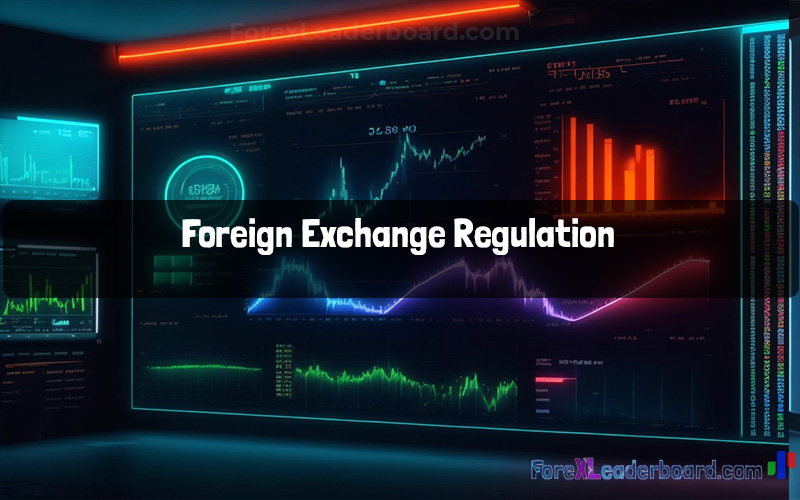Foreign exchange (forex) is a global, decentralized financial market for trading currencies. Given the massive daily trading volumes, proper foreign exchange regulation is essential for ensuring market integrity and protecting traders. This article examines key aspects of forex regulation.
Introduction
The forex market facilitates the buying and selling of currencies, enabling international trade and investment. It is the world’s largest financial market, with over $6.6 trillion traded daily. Forex regulation aims to create fair, orderly, and transparent markets. It provides a framework for acceptable business conduct and protects traders from abusive practices. Regulators typically oversee forex brokers, dealers, and exchanges operating within their jurisdictions.

While no single global body regulates the forex market, most countries have their own regulatory organizations. We’ll explore the major forex regulators and the role they play in supervising markets, firms, and traders.
Key Forex Market Regulators
United States
Several agencies oversee forex regulation in the U.S. The main ones are:
- Commodity Futures Trading Commission (CFTC) – The CFTC regulates the forex futures and options markets. Brokers must register with the CFTC and meet strict financial standards.
- National Futures Association (NFA) – The NFA is an independent self-regulatory organization authorized by the CFTC. It sets and enforces rules for fair trade practices.
- Securities and Exchange Commission (SEC) – The SEC requires forex brokers offering securities-like products to register as securities dealers.
- Financial Industry Regulatory Authority (FINRA) – FINRA is an SRO that supervises brokers doing securities business with the public.
- State regulators – Each state has agencies that license and regulate money transmitters and currency exchangers.
Overall, forex regulation in the U.S. focuses on transparency, financial accountability, and protection of customer funds. Firms must hold sufficient capital, keep segregated accounts, file financial reports, and submit to audits.
United Kingdom
- Financial Conduct Authority (FCA) – The FCA is the chief regulator of the forex industry in the UK. It ensures brokers meet standards for capital adequacy, customer assets, market conduct, and more.
- Prudential Regulation Authority (PRA) – The PRA oversees the financial soundness of banks and large investment firms. This includes capital requirements and reviewing risk management.
- Bank of England – The central bank has supervisory powers and works closely with the FCA and PRA.
UK forex regulation emphasizes principles of good governance, risk management, and transparency. Firms must segregate client funds, submit financial reports, and comply with anti-money laundering rules.
European Union
Forex rules in the EU aim to standardize regulation across member states. Key bodies include:
- European Securities and Markets Authority (ESMA) – ESMA works to safeguard the stability of the EU financial system. It coordinates regulation and supervises credit rating agencies and trade repositories.
- National Competent Authorities – Each EU country has a financial regulator that implements MiFID rules. These include authorizing firms and ensuring compliance.
- European Central Bank (ECB) – The ECB contributes to prudential policies for EU banks and helps harmonize Eurozone banking supervision.
EU regulation requires brokers to have rigorous risk management controls, keep client funds secure, and engage in transparent market practices. MiFID II introduced stricter rules around algorithmic and high-frequency trading.
Canada
- Investment Industry Regulatory Organization of Canada (IIROC) – The IIROC is the national SRO that oversees forex dealers and trading across Canadian debt and equity markets.
- Provincial regulators – Each province has a local securities commission to regulate regional investment dealers and trading activity.
- Bank of Canada – The central bank promotes financial system stability and establishes currency control policies.
Canada emphasizes client asset protections, transparency and disciplinary procedures. Firms must submit financial reports, undergo regular audits, and hold adequate capital.
Australia
- Australian Securities and Investments Commission (ASIC) – ASIC supervises financial markets and monitors forex broker compliance with licensing provisions.
- Reserve Bank of Australia (RBA) – Australia’s central bank administers the country’s Payment Systems and oversees forex settlements.
- Australian Transaction Reports and Analysis Centre (AUSTRAC) – AUSTRAC enforces anti-money laundering and counter-terrorism financing regulations.
Australia requires brokers to hold an Australian Financial Services License. They must submit audit reports, have a compliant dispute resolution process and meet capital requirements. Client funds must be kept segregated in regulated Australian banks.
Japan
- Financial Services Agency (FSA) – Japan’s FSA institutes policy for the banking, securities, and insurance sectors. It ensures financial stability and consumer protection.
- Bank of Japan (BoJ) – The BoJ works to stabilize the country’s currency, money supply and interest rates.
- Securities Dealers Association of Japan – This SRO regulates securities companies to uphold ethics and investor confidence.
Japan emphasizes high ethical standards. Brokers must have strong internal controls, risk management, and adequate capital. They must keep client assets segregated.
Singapore
- Monetary Authority of Singapore (MAS) – Singapore’s central bank regulates brokers and exchanges, promotes monetary stability, and integrates financial supervision.
- Commercial Affairs Department (CAD) – The CAD investigates financial crimes, including money laundering and investment fraud.
Singapore prioritizes transparency, fair dealing, and solvency. Firms must manage risk prudently, maintain business integrity, and ensure proper handling of client assets. Retail forex brokers face strict leverage limits.
Hong Kong
- Securities and Futures Commission (SFC) – The SFC regulates Hong Kong’s securities and futures markets and forex activities. It strengthens regulatory practices and enhances infrastructure.
- Hong Kong Monetary Authority (HKMA) – The HKMA supervises banks and helps maintain monetary and banking stability. It also promotes financial infrastructure development.
Hong Kong follows international standards around capital adequacy, risk management, client asset protection, and market transparency.
Learn which regulatory agencies oversee forex trading in your country. For example, in the United States, the main regulators are the SEC, Commodity Futures Trading Commission (CFTC), and the National Futures Association (NFA). Knowing the key regulators gives insight into the rules brokers must follow in a certain jurisdiction
International Regulators
While individual nations dominate local forex regulation, international groups help align global standards:
- Basel Committee on Banking Supervision (BCBS) – The BCBS provides guidance on banking regulation, supervision and risk management. Basel III introduced enhanced capital requirements.
- Financial Stability Board (FSB) – The FSB coordinates financial authorities and international standards. It makes recommendations about the global financial system.
- International Organization of Securities Commissions (IOSCO) – IOSCO is the leading international cooperative securities regulatory group. Its members regulate over 95% of securities markets.
- Bank for International Settlements (BIS) – The BIS fosters monetary and financial stability. It assists financial authorities with international standards and acts as bank for central banks.
Aspects of Forex Regulation

Forex regulation generally focuses on the following key areas:
1. Licensing and Registration
Firms offering forex trading or related services must obtain licenses or registrations from regulators. The requirements vary between jurisdictions, but often include minimum capital, reporting standards, and compliance procedures.
Regulators oversee license applications to screen out undercapitalized or unethical operators. Approved licenses must be renewed periodically. Registrations help regulators track participation.
2. Capital and Leverage Requirements
Brokers must maintain sufficient regulatory capital to absorb potential losses. Higher capital supports expansion and provides a buffer against insolvency.
Regulators also limit leverage available to retail traders. For example, in the U.S. the maximum is 50:1, while in Japan it is 25:1. This restricts trading losses.
3. Handling of Client Funds
Segregating client funds from company funds is vital. Regulators mandate that brokers keep client funds in separate accounts with reputable banks or liquidity providers. Strict accounting prevents misuse.
4. Reporting and Disclosure
Brokers must disclose risks, fees, and conflicts of interest. They file regular financial reports detailing earnings, trading activity, risk exposures, client assets, and other details. Reports increase transparency.
5. Supervision and Oversight
Regulators constantly monitor markets and conduct audits and investigations of registered firms. This supervision ensures compliance and timely enforcement when violations occur.
6. Dispute Resolution
Regulators enforce processes for handling customer complaints and compensation if brokers engage in malpractice. Usually complaints get escalated through mediation, arbitration, and finally civil action.
7. Business Conduct and Ethics
Codes of conduct cover practices around sales, trading, research, and risk management. They aim to deter fraud, manipulation, and abusive treatment of customers.
8. Anti-Money Laundering
Regulators require brokers to implement strong Know Your Customer and anti-money laundering programs. These combat identity theft, terrorist financing, tax evasion, and other financial crimes.
Check if your forex broker is regulated. Make sure they are licensed by reputable financial regulators like the Financial Conduct Authority (FCA) in the UK, Securities Exchange Commission (SEC) in the US, or Cyprus Securities and Exchange Commission (CySEC) in Cyprus. Regulated brokers must meet strict standards.

Benefits of Regulation
Well-designed forex regulation offers many benefits:
- Market Integrity – Regulation promotes fairness, transparency and accountability – vital for maintaining public trust.
- Risk Reduction – Prudential oversight gives forex brokers strong risk management and internal controls. Segregated accounts keep client assets safe.
- Improved Competition – Regulation creates a level playing field where ethical brokers can thrive while undercapitalized or rogue operators get shut down.
- Consumer/Investor Protection – Regulations safeguard traders from abusive practices like excessive leverage, margin calls, manipulation, or misrepresentation of services.
- Orderly Markets – Regulation aims to reduce harmful speculation and prevent market distortions or crashes that have economy-wide impact.
- System Stability – Oversight of currency markets helps identify systemic risks early and prevent regulatory gaps or arbitrage.
- Crime Reduction – Regulation combats money laundering, terrorism financing and other financial crimes facilitated through forex markets.
- Tax Compliance – Regulations enable tax authorities to detect and deter tax evasion and improve forex trading recordkeeping.
Challenges of Regulation
However, forex regulation also faces some challenges:
- Regulatory Arbitrage – Inconsistent rules across borders allows firms to register in less stringent jurisdictions, avoiding tougher oversight.
- Technology Gap – Innovations like high frequency trading often outpace regulations, enabling unfair advantages until rules catch up.
- Cost Burden – Compliance costs can disadvantage smaller brokers and create barriers to entering the industry.
- Reduced Competition – Strict requirements could consolidate power among fewer larger players over time.
- Deadweight Loss – Regulation has monitoring, reporting and enforcement costs which are passed on to traders through fees or commissions.
- Compliance Failures – Despite best efforts, misconduct still occurs, necessitating strict enforcement regimes.
- Overregulation – Excessive rules could restrain financial innovation or prompt firms to move operations offshore.
- Underregulation – Light touch regulation leaves gaps for unethical conduct, so finding the right balance is key.

The Future of Forex Regulation
Ongoing challenges for regulators include:
- Monitoring high frequency and algorithmic trading across borders
- Updating rules for new cryptocurrency pairs and decentralized exchanges
- Implementing global Know Your Customer and AML standards
- Enhancing international cooperation and information sharing
- Developing more harmonized global regulations
- Regulating retail forex brokers advertising through social media influencers
- Addressing regulatory gaps related to mobile forex trading apps
Technology will enable more automated real-time oversight. RegTech solutions can help regulators analyze risks, improve reporting, and strengthen compliance.
Overall, forex regulation will continue evolving to boost transparency and fairness in the global currency markets. The benefits far outweigh the costs for orderly, ethical markets that inspire public confidence.
Conclusion
Forex regulation establishes essential standards and protections for traders in the currency markets. It aims to uphold market integrity and reduce risks. Key forex regulators include the CFTC, FCA, ESMA, IIROC, MAS, SFC and ASIC. Regulation covers areas like licensing, capital requirements, reporting, client funds, supervision and business conduct.
While regulation promotes fairness and stability, challenges remain around regulatory arbitrage, technology gaps, compliance costs and enforcement. Improved international coordination and new technologies can help strengthen oversight. Well-designed forex regulation plays a critical role in building efficient, transparent, and trusted global currency markets.

